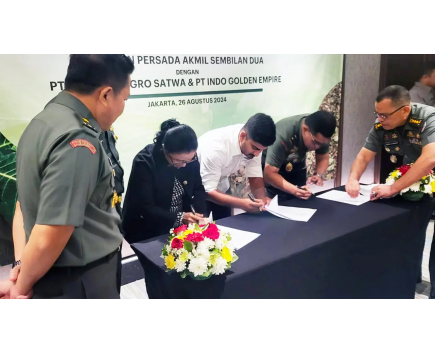
Indonesian Industry Groups Sign Agreement to Improve Kratom Quality
Indonesia's kratom industry is making moves to improve the quality of the kratom products it exports. On August 26, 2024, the Persada Akmil 92 Foundation, in collaboration with the Makmur Agro Satwa Group and PT Indo Global Empire, signed a groundbreaking cooperation agreement.
The Persada Akmil 92 Foundation is an organization focused on sustainable practices within the kratom industry. They collaborate with various stakeholders to improve the quality and export potential of kratom. Their initiatives include setting export standards, supporting local farmers, and enhancing the overall welfare of the community involved in kratom cultivation.
The Makmur Agro Satwa Group acts as an integrator in the kratom industry. They facilitate the cultivation and post-harvest education of kratom farmers. Additionally, they provide agricultural facilities through corporate social responsibility programs. Their role is crucial in ensuring that kratom production is efficient and meets international quality standards.
PT Indo Global Empire is a company that ensures kratom products reach the global market. They focus on maintaining high standards of quality and consistency in production to meet international demands. Their involvement is key to the successful export of Indonesian kratom, making it competitive on the world stage.
To further solidify its position in the global market, Indonesia is focusing on regulations aimed at improving the quality of its kratom products.These efforts include adopting better cultivation practices, implementing stringent quality control measures, and investing in research and development.
Indonesia is the world's top exporter of kratom. An estimated 95% of the kratom consumed in the United States comes from Indonesia, estimated at about 400 tons per year. In Europe, Germany and Czech Republic are major purchasers of Indonesian kratom.
Because of a "Wild West" regulatory environment, contaminated kratom has been an issue in both Indonesia and the US. Not only does this pose risks of heavy metals and bacterial poisoning of consumers, it cost farmers millions of dollars due to importers rejecting shipments.
The Indonesian government and the kratom industry have been promising to improve standards and testing for export.
During the same week as the above agreement was signed, a delegation of American scientists and kratom industry representatives traveled to Borneo to meet with Indonesian government officials to further address issues regarding product safety, public health, and kratom horticulture.














Comments
Leave your comment